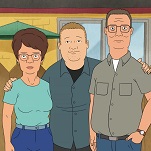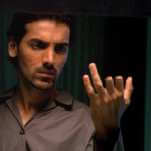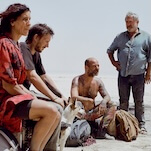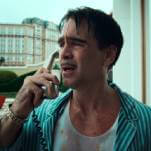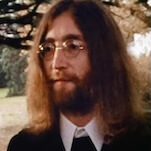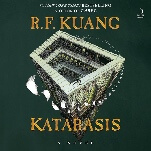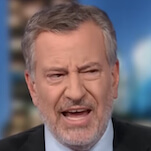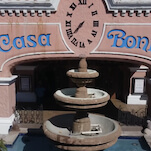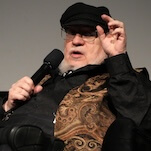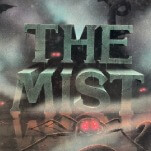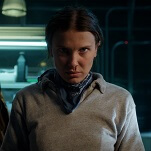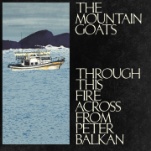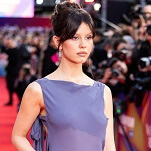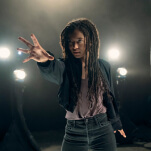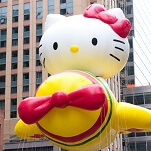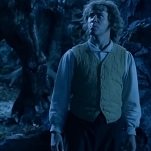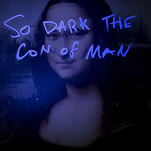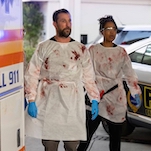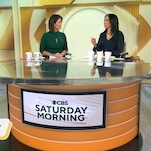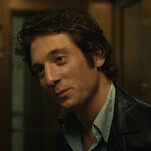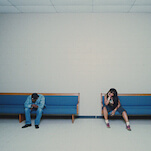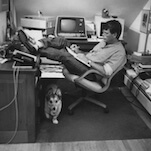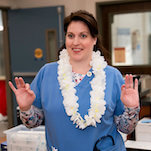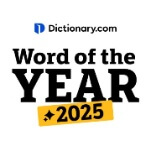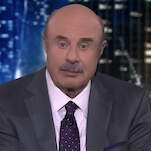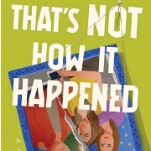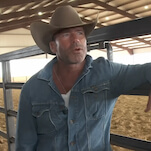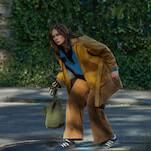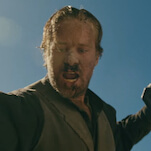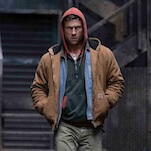"I didn't ever set out to make divisive music."
After playing small California clubs and coffeehouses, Joanna Newsom became a leading light in the beacon of homey, strange folk music drifting through the underground. On tour with the likes of Devendra Banhart, she cut a striking figure with nothing but a harp and her unusual voice, which suggests Björk traipsing through the American countryside. Since March, when her album The Milk-Eyed Mender came out on the Chicago label Drag City, she's drawn growing attention, owing to her literate songwriting and the word-of-mouth praise trailing her striking live shows. During a brief stay at home in Nevada City, California, Newsom spoke to The Onion A.V. Club about the harp, music school, and coming to terms with a voice she learned to love.
The Onion: When did you start playing music?
Joanna Newsom: I didn't sing for years and years, but I started playing harp when I was maybe 9 or 10. I had actually wanted to play for years leading up to that, but no teacher in our little town would take me on as a student, because I was too young. I did a lot of classical and Celtic music for years—and actually, from the first lesson onward, also a little bit of improvisation and composition, because I had a really amazing teacher who emphasized that stuff. Around sixth grade or so, I went to a folk-music camp, where I learned a lot of strange harp forms, like West African and Venezuelan harp music. A lot of that stuff became my focus for a few years. Then, around eighth grade, I decided I wanted to be a composer, so that's when my focus shifted again, and that's what I went to college for. Just a few years back, I switched out of composition and into creative writing so I could work with words.
O: What initially drew you to the harp?
JN: I don't actually know. Unfortunately, I'm assuming it had something to do with all the things that I associated with the harp when I was little, things that appealed to a little-girl mentality. I think I associated it with fairies and princesses and magical realms and angels and stuff. But there's something fundamental to the harp that has retained its appeal my whole life. It's an instrument I am just in love with.
O: Your playing floats between simple folk and complex, composerly music. Was there ever friction between the two as you learned?
JN: There wasn't much friction for me, but I think that there may be for some people studying the harp. I had a really special teacher who was mainly concerned with showing me my options from an early age: letting me know what was out there musically and what the harp was capable of, and not drawing any major stylistic or pedagogical lines. She would teach everything the same way, with the same sort of weight placed on everything.
There was no mentality like that in the Western classical stuff I was studying, which held itself up as the height of harp music while Celtic folk was, like, the low. But I didn't really know a lot of the history when I was younger. I didn't realize that the harp is coded in such a specific way in musical circles. It's kind of this society instrument because of its history as a young woman's parlor instrument. Families of privilege and money would have harps in their parlors, and their cultured daughters would learn to play. It's got such a strange history. But that wasn't the context that I learned it in, so the inherent friction between that history and the more humanist folk-y history wasn't in my conscience at all.
O: What has the response been like since your album came out? There's seems to be a steady build as more people see you on tour.
JN: It's been eye-opening, in that there's been almost as much strong negative response as there has been strong positive response. I didn't ever set out to make divisive music. It seems to be a continuing comment that you either hate it or love it. That was a shocking idea to me. I never thought people would be mortally offended by the sounds I was making. It's true that there has been a slow build-up of press stuff and reviews and things, but on tour, I was really immersed in playing and performing, so I was kind of out of touch. I did sense this strange growing energy at the shows: The shows at the end of the tour had more people than the shows toward the beginning. That usually happens regionally, when more people go back the second time you play somewhere, but this seemed to be more than that.
O: It's pretty striking to see a harpist in a rock club. Have there been stares and jeers, or anything like that?
JN: I don't look at people's expressions, because I still get nervous when I play, especially when I first put the harp up there. I just try to tune—it takes me a half-hour to tune, and I get nervous if I look at anybody when I do it. I've been unaware of how people react to the instrument. People have ideas of what a harp is supposed to sound like, and a lot of them are negative ideas. I had known that people would probably have strange reactions to my voice, because I have kind of an unwieldy, difficult voice, but I never thought that anybody would have a problem with the harp. I just assumed… C'mon, it's a beautiful instrument.
O: There's been a lot of talk about a new, weird folk scene in California. Is that in the air there?
JN: I would assert that there's not one now, nor is there one nationally. I think people are playing music the same way that they always have, but there's been a rising interest in that music in the last six months or so. It makes me a little nervous to be associated with it, to be honest, partly because I think it's too easy. There are all of these references to "The New Folk Underground," but a lot of it springs from different universes.
O: You described your voice as "unwieldy" and "difficult." How did you come around to singing?
JN: I'd never sung except secretly. I was really self-conscious of my voice, because of all the instruments I'd approached formally with training. I have a voice that's obviously untrained—and I think untrainable—so I kind of secreted it away for a long time. Actually, I would write songs with lyrics when I was younger, but I would just sing in my head. Then, in an American music class, I was introduced to some older Appalachian folk music, and I felt a real affinity with some of the singers that I heard, particularly a singer named Texas Gladden, who was a grandmother who Alan Lomax recorded. I was really affected and touched by the sound of her voice, which differed from any conventional idea of a beautiful voice. Hearing some of that stuff prompted me to consider my own voice to be an instrument at my disposal, just like the harp.
